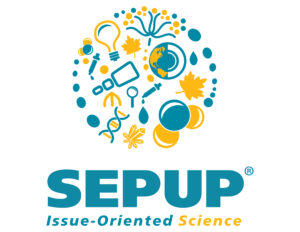
Learning List has reviewed LAB-AIDS’ SEPUP Science resources for middle school science (i.e., grades 6-8) and high school biology courses. LAB-AID’s inquiry-based program organizes instruction around themes related to societal issues and students’ lives. Hands-on activities are at the center of instruction and provide opportunities for all students to explore science concepts. Course resources are available in print and eBook formats.
The Science Education for Public Education Program (SEPUP) Science program incorporates a student-centered, activity-based approach to instruction. Content is organized using the 5E Model of Instruction (i.e., engage, explore, explain, elaborate, evaluate), and investigations are at the center of learning experiences. Teacher Resources include detailed guidance in implementing the SEPUP system of instruction, including questioning strategies, formative and summative approaches to assessing student progress.
Literacy strategies are embedded throughout instruction. New vocabulary is introduced in context and referenced in the student edition index. Student readings reinforce the concepts addressed in investigations and frequent writing activities allow students to reflect on and derive meaning from their experiences. Course activities are designed to address the learning styles of young adults and incorporate many opportunities for peer interaction, including role play and collaborative group work.
About LAB-AIDS’ SEPUP Science*

Part of UC Berkeley’s Lawrence Hall of Science, SEPUP continues to be a not-for-profit project that is primarily supported by grants. However, most of our curriculum is now intended for schools. We have commercially available curricular materials that are used in school districts from Los Angeles to New York. For information on purchasing these materials, please visit LAB-AIDS, the sole producer and distributor of SEPUP materials.
*The content in this section is provided by or adapted from LAB-AIDS’ SEPUP Science.
Subscribe to Learning List for access to full editorial reviews, alignment reports and spec sheets.